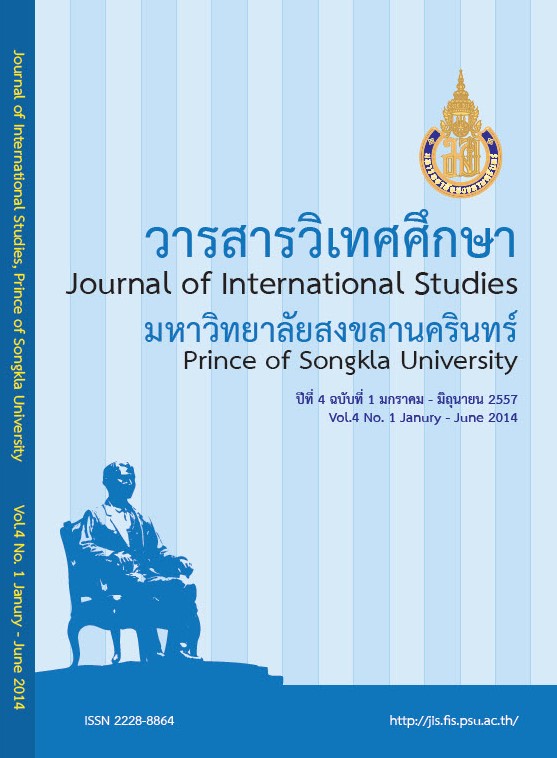Now and Future of Thai Dramas in China
Main Article Content
Abstract
This article aims 1) to study the current situation of Thai dramas, which have been broadcasted on television and the
Internet, 2) to analyze factors contributing to reputation and popularity of Thai dramas, and 3) to study the trend of Thai dramas in the future. The study showed that Thai dramas gradually became more popular. There will be an upward trend for Thai dramas in China in the future. This is because of internal factors such as actors, actresses, location and copyright charges. External factors, such as advanced technology and declination of Korean series, also play an important role in the booming of Thai dramas. However, copyright law in China has not been enforced strictly. As a result, Chinese audiences commonly watch Thai dramas via the Internet, causing Thai drama producers not to earn any compensation at all.
Article Details
Statements and opinions expressed in articles herein are those of the authors and do not necessarily reflect the position of the editors or publisher.
Article, information, text, image, etc. which are published in Journal of International Studies, belong to Journal of International Studies. If anybody or any organization would like to use part or whole of them, they must receive written permission from Journal of International Studies before usage.
References
โกสินทร์ บุณยวัฒโนภาส. (2013). ซอกแซกกุ้ยโจว: ละครไทยบุกจอแก้วกุ้ยโจวเป็นครั้งแรก. เข้าถึงข้อมูลวันที่ 1 พฤศจิกายน 2556 สืบค้นจาก http://www.thaibiz.net/th/event-calendar/detail.php?ID=13399.
ไท ทาร์ซาน. (2013). ต้มยำกุ้ง 2 ฉลุย 50 ล้าน สู้ 100 ล้าน จา พนม โชว์ฝีมือนักบู๊สู้ระทึกใจ. เข้าถึงข้อมูลวันที่ 1 พฤศจิกายน 2556 สืบค้นจาก http://www.thairath.co.th/content/ent/379804.
ไทยรัฐ. พาณิชย์ฝันบันเทิงไทยผงาดเป็นที่ 1 ของเอเชีย. เข้าถึงข้อมูลวันที่ 12 พฤศจิกายน 2556 สืบค้นจาก http://www.thairath.co.th/content/eco/33433.
สิทธิเทพ เอกสิทธิพงษ์. (2012). น้ำเน่าแบบไทย ๆ ในสังคมจีน. เข้าถึงข้อมูลวันที่ 12 พฤศจิกายน 2556 สืบค้นจาก http://www.manager.co.th/China/ViewNews.aspx?NewsID=9550000001084.
สุทธิชัย หยุ่น และ วีณารัตน์ เลาหภคกุล. (2011). T-POP บันเทิงไทยฟีเวอร์ในจีน. ช่อง 9 อ.ส.ม.ท. 15 กุมภาพันธ์ 2554.
ศูนย์วิจัยกสิกรไทย. (2013). คาดปี 56 บันเทิงแดนมังกรโตต่อเนื่อง...เปิดโอกาสหนัง ละครไทยโกอินเตอร์. ข้าถึงข้อมูล วันที่ 13 ธันวาคม 2556
สืบค้นจาก http://www.thannews.th.com/index.php?option=com_content&view=article&id=195659&catid=176&Itemid
=524.
James Hookway. (2010). Hungry for Drama, Chinese Viewers Send Out for Thai. Retrieved 12 November 2013, from http://online.wsj.com/news/articles/SB10001424052748704584804575644610069449980.
Jirameth Rungruang. (2554). The effects of the Memorandum of Understanding to televise Thai Soap Operas in P.R. China. Prince of Songkla University Journal of International Studies. 1 (2).
陈华. (2010). 泰剧的流行对我国受众的影响. 新闻世界. 2010(5), pp.189-190.
陈晓燕.(2013). 睛彩之旅-泰剧泰来 贵州电视台泰剧播出季欢乐开启.人民网. Retrieved 10 April 2014, from http://gz.people.com.cn/n/2013/0802/c194827-19217103.html.
成都商报. (2010). 泰,帅 泰剧帅哥泛滥 迷倒花痴一片. Retrieved12 November 2013, from http://www.anhuinews.com/zhuyeguanli/system/2010/05/29/003021168.shtml.
侯芳芳. (2011). 泰剧进入中国市场的传播学分析. 广西大学硕士学位论文. 第6页.
李胜龙. (2011). “韩流”退潮现象原因分析. 新间界. 第4期.
欧贝贝. (2011). 泰国电视剧走红中国荧屏 抓眼球虐恋情深是王道. Retrieved 1 November 2013, from http://ent.cntv.cn/20110714/100365.shtml.
徐小立和胡筱. (2012). 从“粉丝”身份转变看泰剧在中国的传播. 云梦学刊. 第33 卷第3 期, pp.146-147.
王真. (2012). 中国“泰剧热”还能热多久. 大众文艺. 2012 (21).pp.129.


